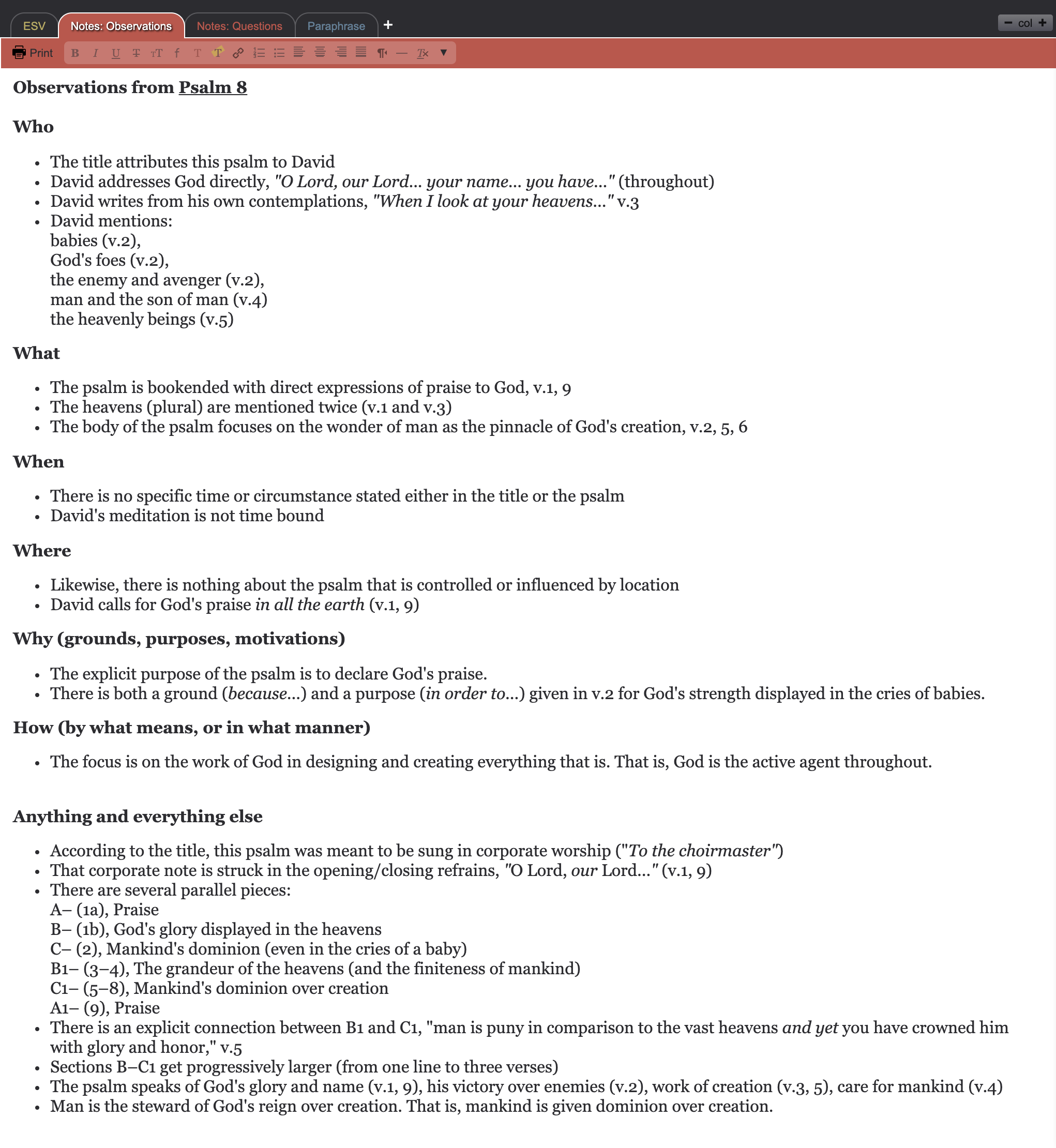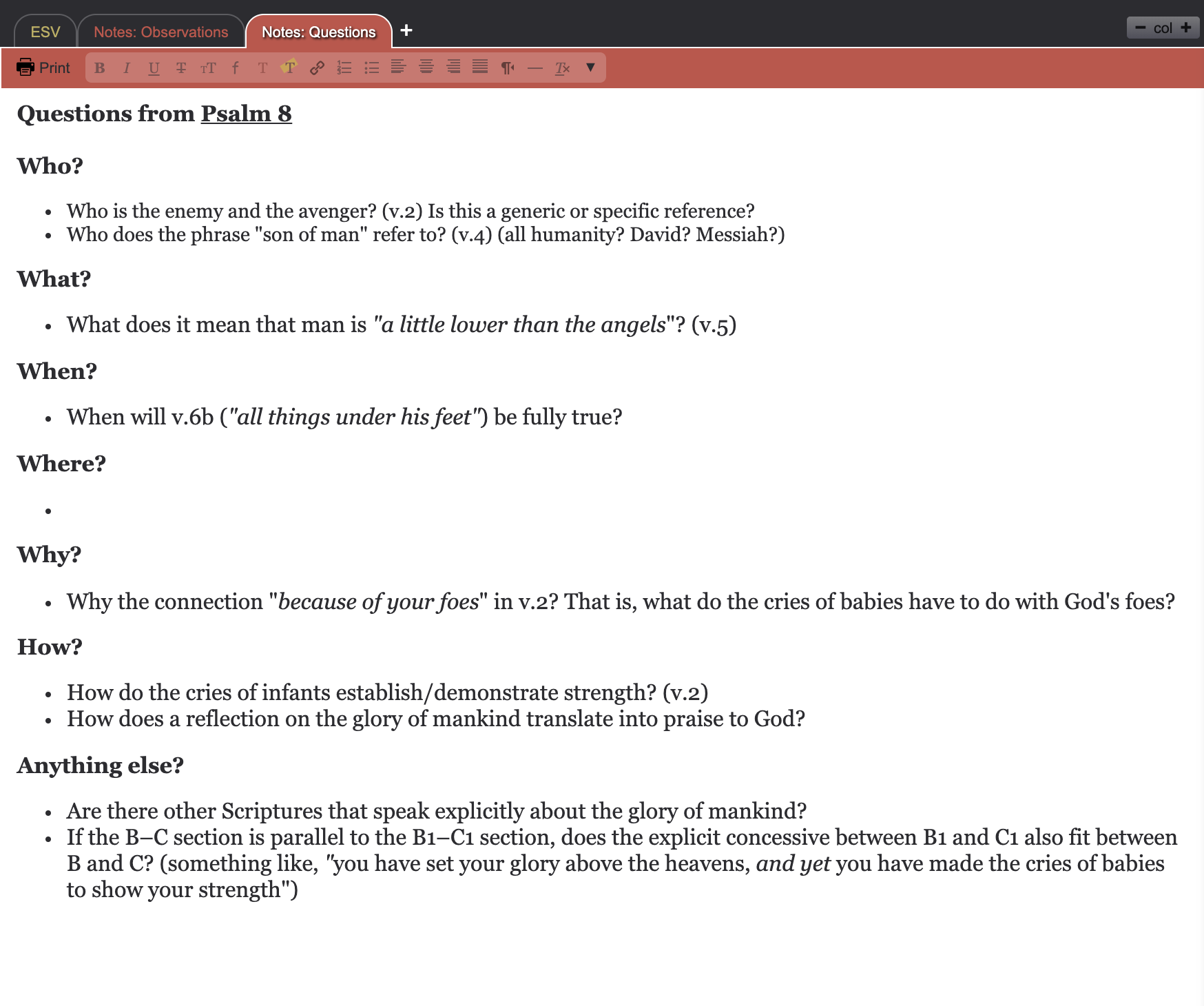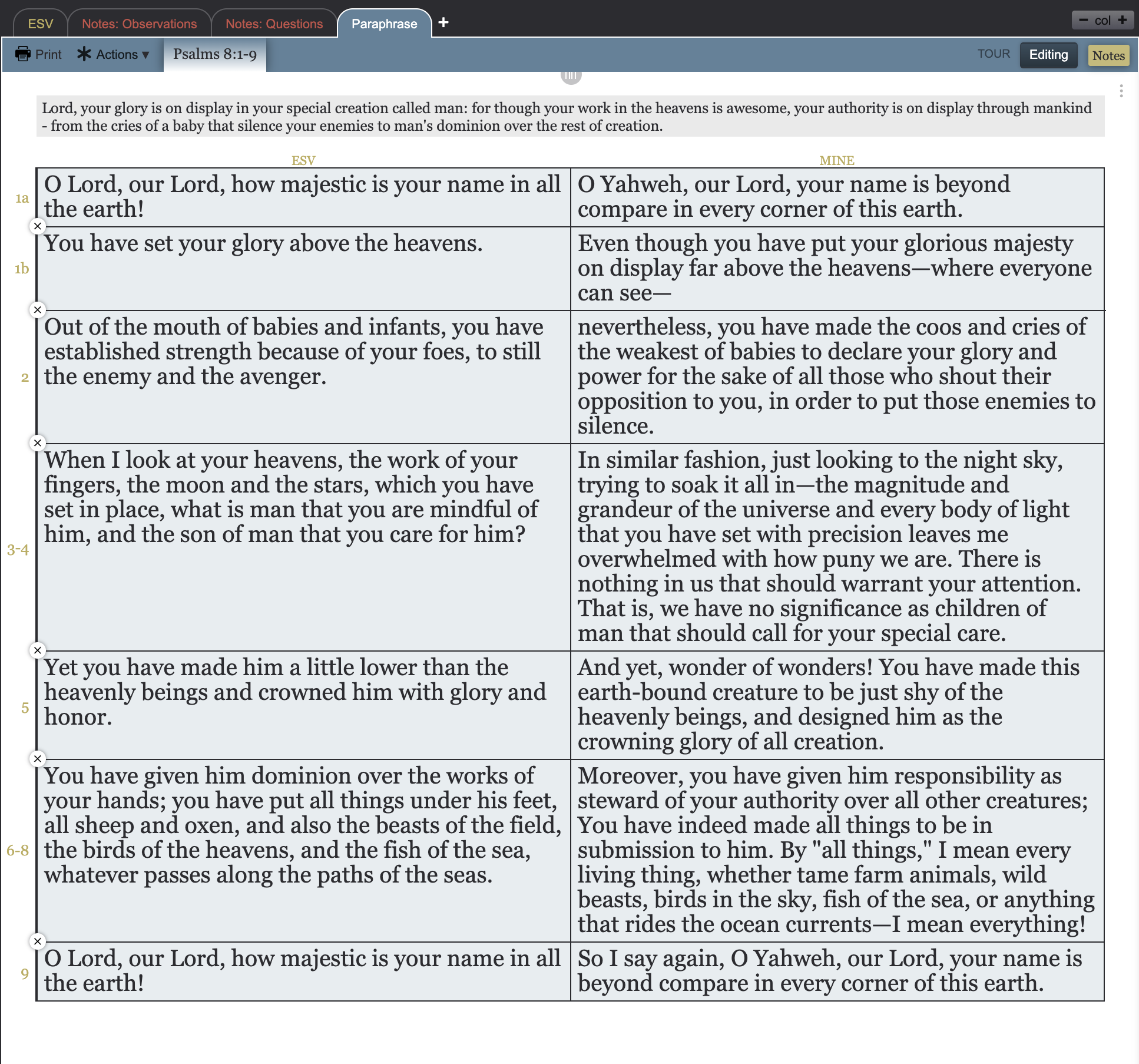Week 1 | Mary's Song of Praise
Paraphrase: Restate it in your own words
A brief introduction to Paraphrasing:

What is the purpose and value of writing a paraphrase?
Let me begin by stating an important point: the purpose of writing a paraphrase is not to improve the text of Scripture.
Rather, the aim of a paraphrase is a clear expression of your understanding of a text. Thus a good paraphrase does not come by simply grabbing a thesaurus and changing a few key words.
The ability to accurately restate another’s thoughts in your own words is a vital test and demonstration of your understanding.
In my experience, writing a paraphrase is one of the most difficult—and most rewarding—tasks in Bible study. Difficult, because you must wrestle with your questions until you break through to a clear understanding. You simply cannot put into your own words what you do not yet comprehend. Yet rewarding, because when you finally are able to state it in your own words, you know there is clarity, and you are able to share it with others and help them understand as well.
So how do we get there?
Especially at this time of year, we are all surrounded by distractions—both necessary and frivolous. (How many times have you checked your smart phone in the last hour?) And even if we can get away to a quiet place for a time, our own minds can be flooded with thoughts, plans, anxieties, conversations, etc.
There are, of course, many fruitful Bible study strategies. In this lesson, I want to focus on a few basic but often neglected tools for effective reading of Scripture.
1. Meditate upon God’s word
This Book of the Law shall not depart from your mouth, but you shall meditate on it day and night, so that you may be careful to do according to all that is written in it. For then you will make your way prosperous, and then you will have good success.
Joshua 1:8 ESV
I will meditate on your precepts and fix my eyes on your ways.
Psalms 119:15 ESV
What does it mean to meditate on God’s word?
Maybe I should begin to answer that question by clarifying what it is not! Meditation, for many people, evokes an image of someone sitting on the floor with legs crossed, eyes closed, and chanting “ommmmmm.” Certainly this is but a caricature of the Eastern meditation we often associate with yoga and similar practices. Nevertheless, it is essential to understand the vast distinction between Eastern meditation and the biblical concept of meditation. Simply put, Eastern meditation seeks to empty the mind, while biblical meditation seeks to fill the mind.
Let me offer the following definition: Biblical Meditation is lingering long over a portion of Scripture with careful, prayerful thought to both the meaning of the text and its implications for our lives.

2. Read the passage multiple times
It takes patience to read well. Sure, there is some value in speed reading in the right context. But the goal of reading Scripture is not merely to get through as many pages as we can. Rather, it is to steep our hearts and minds in God’s word. It is to let God’s word work its way in so that our thinking and our affections are shaped by its truth.
Take time this week to read through Luke 1:39–56 several times. Read the passage in two or three different versions. Read the text out loud. Listen to someone else read. And then, read it again.
3. Make Observations
We actually do this every time we read with everything we read. We make mental notes about what kind of document we are reading, who wrote it, why, and how much attention we should give it. We follow the author’s logic or at least we try to. We discern the tone and emotions of the dialogue. With a set of instructions, we see how many steps there are (often wondering, “How long is this going to take?” or for those assembling Christmas gifts, “What steps can I skip over?”)
One great way to train ourselves to pay careful attention to Scripture is to purposely slow down this task of making observations and write (or type) out everything that we are seeing. There is only one rule for this task: everything is worth recording. There is no observation too obvious to not record.
This may be a new discipline for some. And it may seem very hard at first. But it is a skill that can be developed with practice. What should you record? The short answer is anything and everything you are seeing. To be more specific, think in terms of the five W’s… and an H: Who, What, When, Where, Why, and How.
Here is an example of my observations from Psalm 8.

A word of caution:
Making observations from the text is a process of discovering what is there, in the text itself. Interpretation on the other hand is asking, What does this mean? Making good observations is indeed a vital part of the interpretation process but we need to guard against running too quickly to interpretive conclusions. At this stage, we are still gathering information, coming to an understanding. Interpretation is still a work in progress, we are not yet ready to draw conclusions.
Moreover, though we are already beginning to see and consider the implications of what we are reading, we are not yet fully equipped to make sound application of the text into our own world. There is more work to be done and great danger in the misapplication of a half-understood passage.
4. Ask Questions
Continually probe the text with questions. What questions? Try asking anything that begins with Who...? What...? When...? Where...? Why...? or How...? I’m guessing you recognize that list from the Make Observations task. In practice, making clear, helpful observations and asking insightful, probing questions go hand-in-hand. Each task serves and benefits the other.
As with making observations, don’t be afraid to record any and every question that comes to mind. It is always worth asking, just as it is always worth writing the answers you discover. Sometimes just the work of framing even a simple question will help sort out larger interpretive issues.
Here are a few of my questions from Psalm 8.

On writing a paraphrase
The final task in the lesson is to write a paraphrase. If you need to, go back to the top of the page and refresh your memory on the value and purpose of writing a paraphrase. (I’ll wait for you here, until you get back.)
Okay, ready? Let me give you a few helps concerning the task of writing a paraphrase.
- Aim to make the logical links between ideas very clear. Sometimes an author will use explicit conjunctions (connecting words) like and, but, because, since, therefore, however, in order to, that is. On the other hand, sometimes those connections are only implied or ambiguous. As you seek to understand the author’s thought flow, make your understanding clear in your paraphrase.
- Again, don’t just change a few key words and use close synonyms. Express your understanding in your own words.
- You will find that a paraphrase generally expands the text for the simple reason that a paraphrase unpacks ideas.
- Try to appropriately capture the author’s tone and points of emphasis.
- If you find a verse particularly hard to restate in your own words, it may indicate that you don't yet fully grasp the author's thinking. Go back and dig further into the text and prayerfully pursue understanding.
Here is my paraphrase of Psalm 8.
